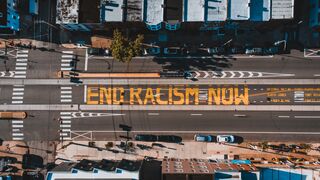Bias
Experts Answer 8 Critical Questions About Racism
Part 1: Answers to the questions you most want to know about.
Posted February 8, 2021 Reviewed by Ekua Hagan
I had the honor of interviewing anti-racism experts and advocates on critical questions regarding racism. This post includes questions 1-4, and Part 2 covers questions 5-8. I found that these were the most common questions that came up among my non-black/brown patients, friends, and colleagues.

1. It’s insulting to respond to “Black Lives Matter” with “All Lives Matter.” Please explain this.
Myrna Brady: It is absolutely insulting to a black person when they are told “All Lives Matter.” The mere inference that this denigrates others is exactly why “Black Lives Matter" exists. History tells us that black lives were only worth three-fifths of a vote at one time in America.
The message is not only Black lives matter; the message is that Black lives matter too. It’s as if a wife asks her husband, “Honey do you love me?” and her spouse replies with, “I love all women equally because all women matter.” So before one inserts “all,” please take the time to either ask a Black person why this movement has started and/or research the deeply seeded inequity Black people have experienced in this country. You will realize very quickly that “Black Lives Matter” too!
2. I have heard, “Stop asking the Black community to help you with your guilt and pain.” How are we doing this (by how we’re communicating, what we’re doing, or in some other way)? Where do you see the responsibility lying within us?
Francesca Maximé, SEP, CMT-P, IFOT, RLT: Black and brown people, people of color, are exhausted by current events and by years of systemic racism and microaggressions ... It can feel very extractive if you’re going to BIPOC (Black, Indigenous, and People of Color) to answer your questions. Spend all your time doing your own work interrogating whiteness and how it lives in you, your thoughts, beliefs, patterns, actions, and behaviors.
Do not do performative mea culpas; do not publicize this; don’t get frozen in a shame spiral; be accountable. Spend your money and time on educating yourself about all the things you don’t know, weren’t taught, and now need to learn.
Do not ask your BIPOC friends what something means, like “What does BIPOC mean?” Look it up. Don’t say things like “your people.” Take classes and understand why this is a microaggression. Don’t assume you are a safe space for BIPOC to come to and confide in or talk to, even if you’re “friends.” You have no idea how many things you have done to offend, step on, dismiss, or defend.
You have no idea how many ways in which your lack of awareness and education shows up in service of protecting yourself versus in being present and tolerant of your own discomfort while opening to the raw pain of a BIPOC colleague or friend. The only work a white person has to do right now is to leave BIPOC alone and do your work.
You don’t need to advertise it. You don’t need to “check in” with your BIPOC friends. You need to commit to being actively anti-racist and that means making a commitment to incorporating classes, books, and conversations with other white people in a regular space (like Ruth King’s Racial Affinity Group program).
Once you do this work, you’ll listen more easily. You have to take this on. You’ll get closer to a pain you’re privileged to not even feel. You’ll understand why nobody who is a BIPOC wants to explain to you what you don’t know. When you do this work, it will begin to dawn on you all that you don’t know. It’s uncomfortable and hard for you; it’s deadly for BIPOC. You can do it.
Interrogate whiteness and structural racism. It’s work you can do on your own. Racial Equity Institute, The People’s Institute, Patti Digh’s racism course, Dr. Joy DeGruy, all offer classes on this. Learn what you had to give up to “become white,” from cultural practices to your own spirit and natural, innate, empathic attunement. It’s a lifelong commitment and the only way we can begin to enter into collective healing and well-being.
Being accountable feels like being called out. It’s a calling in. It’s the work white people must do on their own and with one another.
Blacks built this country after being kidnapped and enslaved. No more emotional labor should be needed from them for your comfort and to appease your curiosity. Understand your own whiteness; that’s the job. In the collective healing space of “all my relations,” we are connected, but there are some insights and “aha” moments only a white person can experience for themselves in order to help inform their own insights as to how they’ve moved about in the world as a white person and the cost of whiteness to BIPOC.
Use the process of RAIN (Recognize, Allow, Investigate, and Nourish) to help support the “U-turn” needed to do the inner work, holding yourself in warm regard (positive self-esteem): same as other people, no better or worse, but who has had physiological habit patterns develop over time that have, as a product of white body supremacist culture, necessarily caused harm to self and others. White body supremacy causes rage, anger, shame, guilt, and deep grief. When we move to remorse and allow our hearts to be cracked open with sadness, we can begin to be more of an embodied ally and anti-racist.
3. Why isn’t it OK to say the N-word no matter what? Why is it that sometimes it’s used among individuals in the Black community?
Myrna Brady: Simply put, the N-word was used to disparage Black people since the onset of slavery. The meaning inferred that one was a slave of dark skin, ignorant and lazy. Dictionary.com indicates “that the term 'N' is now probably the most offensive word in English.” The history and trauma associated with this word evoke feelings and emotions in people that have caused arguments to physical altercations. Needless to say, it would be in everyone’s best interest if the word were simply erased from the English language.
The use of the N-word was initially learned from slaveowners in this country. Black people were called this racial epithet and were instructed to refer to each other as such amongst each other. As a result, the word became a part of the Black vocabulary. Over the decades, Black people have tried to disempower the word by turning it into a term of endearment to mean “my brother/sister.” The word has become a “verb, adjective, and noun” in mainstream music and amongst some generations in their colloquial dialects.
The mainstream daily usage of this word has anesthetized many to the true offensive meaning of the word. There is an ongoing debate amongst the Black community about the use of the word amongst themselves. However, one thing that most Black people unequivocally agree upon is that non-Black people should never use the word at all.
4. Please explain the Race-Based Trauma Theory by Robert T. Carter. How does it explain the impact of Post-Traumatic Stress Disorder (PTSD) and historical and intergenerational trauma due to racism?
Michelle Maidenberg, Ph.D., MPH, LCSW-R, CGP: Robert T. Carter, a professor at Columbia University, and his colleagues developed the Race-Based Traumatic Stress Symptom Scale (RBTSSS), which assesses the emotional impact of racism. His theory of race-based traumatic stress implies that there are individuals of color who experience racially charged discrimination as traumatic and often generate responses similar to post-traumatic stress.
Race-based traumatic stress combines theories of stress, trauma, and race-based discrimination to describe a particular response to negative racial encounters. Race-based traumatic stress can be experienced both directly and indirectly and can occur on an interpersonal, institutional, or cultural level.
Race-based traumatic stress is viewed as a consequence of racially motivated discrimination, exclusion, and unjust treatment. Interpersonal racial discrimination has been found to have more of an effect at the individual level, often demonstrated in mental health symptoms such as trauma, anxiety, depression, stress, and physiological symptoms such as hypertension.
Racial discrimination at the institutional level has been found to result in social inequities for people of color, such as higher rates of incarceration, health disparities, and educational difficulties. Cultural racial discrimination has been found to be associated with internalized racism, often resulting in individuals devaluing their own culture in ways such as denouncing their cultural heritage and values and/or internalizing negative stereotypical beliefs associated with their own racial group. Research also indicates that the internalization of racial oppression can lead to feelings of shame and malice.
Children are particularly vulnerable to the detrimental effects of race-based traumatic stress, which they experience in the form of exclusion, bullying, and physical violence. Because of where they are at developmentally, they often lack the coping skills needed to work through and process the stress.
These experiences can be internalized as traumatic and associated with the development of mental health disorders, such as post-traumatic stress disorder (PTSD). Discrimination experienced in childhood may lead to low self-esteem, difficulties with academic performance, and increased externalizing behaviors, such as acting out, defiance, anger, mistrust, and internalizing behaviors such as depression or anxiety.
See "Experts Answer 8 Critical Questions Regarding Racism, Part 2" for questions 5-8.
Here is an Eradicating Racism and Honoring Dr. Martin Luther King Jr. Guided Meditation led by me.
The esteemed guests are:
Myrna Brady is a national fitness presenter, certified personal trainer and group fitness instructor/coach and motivational speaker. She experiences great joy in teaching people how to become a better version of themselves.
Francesca Maximé, SEP, CMT-P, IFOT, RLT is the founder of ARREAA: Anti-Racist Response-ability, Embodiment, Accountability, and Action, a weekly Wednesday group for white-bodied folks to “ask anything” so they don’t have to ask BIPOC friends. Francesca is an anti-racism educator, somatic experiencing trauma healing practitioner, and Indigenous Focusing-Oriented practitioner for complex trauma.
References
*For an extensive list of anti-racism resources, please see my article “The Most Important Step You Can Take to Eradicate Racism.”




